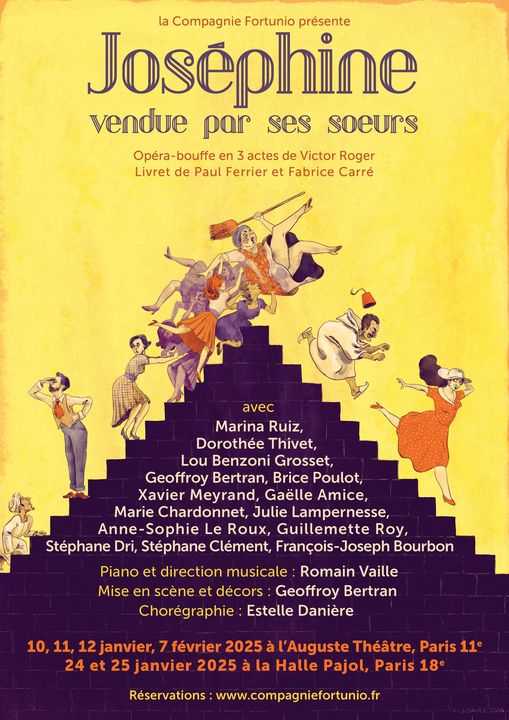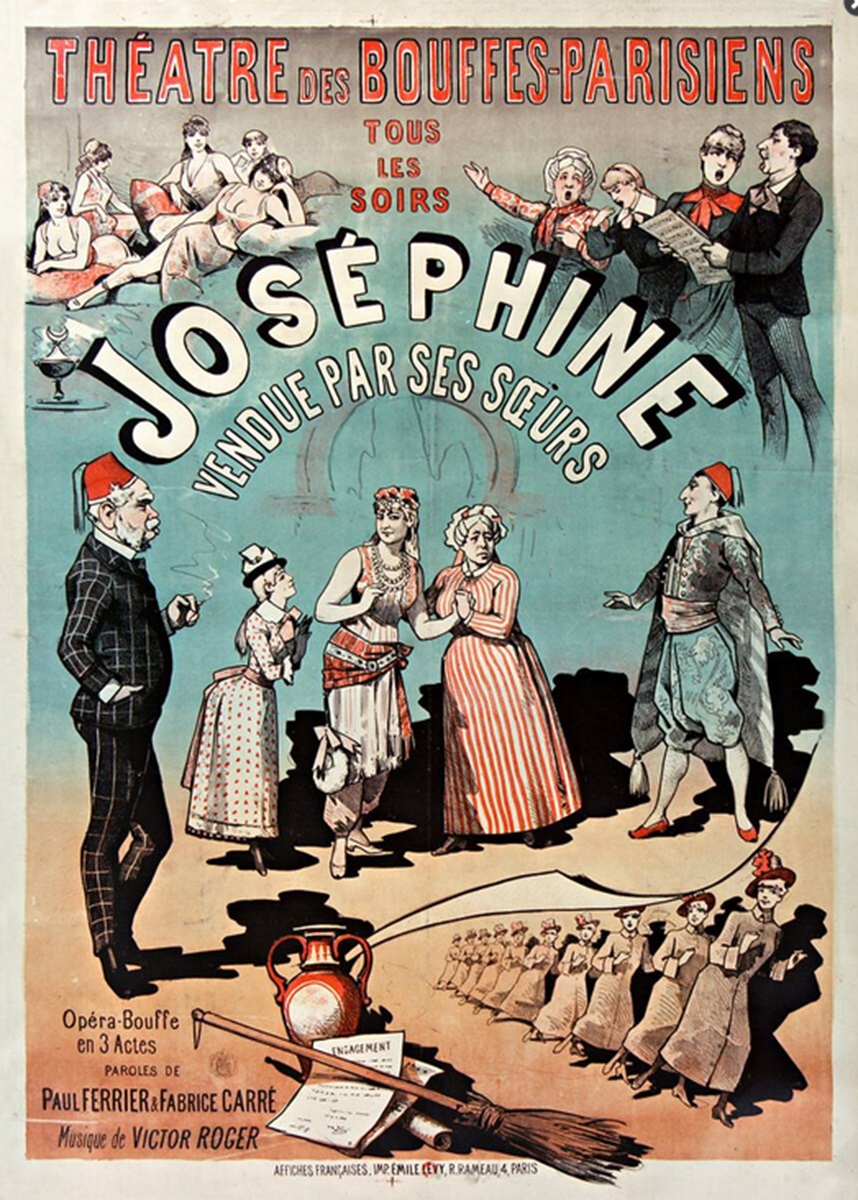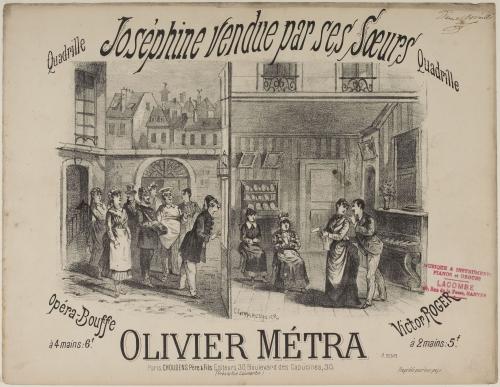Kurt Gänzl
Encycopedia of the Musical Theatre
24 October, 2024
In January 2025 the Compagnie Fortunio is bringing the opéra-bouffe Joséphine Vendue Par Ses Soeurs back to Paris, for a string of performances at the Auguste Théâtre and at La Halle Pajol. Here is Kurt Gänzl’s chronicle of the show’s performance history from his Encyclopedia of the Musical Theatre.

Poster for the 2025 production of “Joséphine vendue par ses soeurs”-
Joseph and the Amazing Technicolor Dreamcoat was not the first musical to utilize the biblical tale of Joseph for its libretto, but the 1886 Joséphine vendue par ses soeurs treated the tale rather differently. The piece in 3 acts by Paul Ferrier and Fabrice Carré, and with music by Victor Roger, pre,,iered at the Théâtre des Bouffes-Parisiens in Paris on 20 March 1886.
Ferrier and Carré called their piece an opéra-bouffe, and there was little doubt that it treated Joseph’s story in a burlesque fashion, even if the result was a finished and funny French farce with little of the burlesque extravagance of earlier years about it. To start with, as the title made plain, Joséphine had its sexes reversed.

Poster for the original production of “Joséphine vendue par ses soeurs” in Paris. (Photo: theatremusicaloperette.fr)
The widowed concièrge Madame Jacob (Mme Macé-Montrouge) has twelve daughters but, whilst the others have to tighten their belts and go out to work, Joséphine (Jeanne Thibault) is the spoiled darling who wants for nothing. For Joséphine is at the Conservatoire and she is training to be a musical theatre star. The exasperated sisters plot together and they manage things so that Joséphine is finally ‘sold’ to the love-struck Egyptian Alfred Pharaon Pasha (Édouard Maugé), with what she thinks is a contract to star at the Cairo opera. However, when Joséphine gets to Egypt she finds that it is the Pasha’s harem rather than his theatre that is in store for her. Madame Jacob and her daughters and Joséphine’s beloved baritone, Montosol (Piccaluga) are, however, hot on the Egyptian trail, and the wily concièrge soon takes control.
She is determined that Joséphine will indissolubly wed the fabulously wealthy Pasha before bedtime, and that Alfred shall spend his fortune on getting her dozen daughters good (rich) husbands. But Alfred, dragged off to Paris by Madame and her girls, ends up being sacked from his regal post for neglecting his offices for the sake of his amours. When he finally gives up his amorous pursuit, his bank balance battered and his masculinity thoroughly tried, Joséphine is left virginally to wed her persevering baritone, while Madame Jacob settles down in the nice new concièrgerie he has lavished on her without a single daughter. They have all, as she planned, been nicely married off, thanks to the dowries supplied by Alfred. The principal soubret parts of the show were Joséphine’s youngest sister, Benjamine (Mily-Meyer), and Alfred’s traditionalist, anti-French nephew, Putiphar Bey (Charles Lamy), whom she ultimately subdues.

Musical arrangement of “Joséphine vendue par ses soeurs” by Olivier Métra. (Photo: Musée Carnavalet, Histoire de Paris)
The humour of the text permeated the whole of the show’s score. Even the nominal lovers of the play, Joséphine and Montosol, gave forth with humorous numbers, albeit in a lyrical mode. Joséphine justified her choice of a baritone in the first act Couplets du conservatoire, pleaded with Alfred to let her return to Paris (‘the conservatoire, the rain, and the omnibus accidents’) in a rondeau-valse, launched into extravagant operatic duo with Montosol in a first-act rehearsal and again in the second act (‘Je lui disais encore’), on both occasions to splendidly funny effect, and repulsed poor Alfred in a third-act ronde. Montosol gave forth with operatic fervour, beginning with a romance in the first act (‘Je ne vois que vous seule’) and topping his second-act solo with what he vowed would be his last high A flat in what he vowed would be his last serenade, before launching into the big duo of the evening.
The soubrette rôle of Benjamine also had a large share in the music, with a number in each of the first two acts, a duo with Putiphar in the third, and, above all, the famous section of the first act’s quartet in which she downed the operaticizing of her sister and Montosol with a brisk little bit of sexy nonsense illustrating her own rather lighter taste in music: ‘Ugène, Ugèn’ tu me fais languir, ou y a d’hygiène y a plus de plaisir’. Alfred, Putiphar and, briefly, Madame Jacob, all took a share in the music, which included several ensembles and concerted finales alongside its principal numbers.

Mme Block in “Joséphine vendue par ses soeurs”. (Photo: Ebay)
Joséphine was a great success on its production in Paris, with Mily-Meyer, in particular, winning a triumphant reception as the perky and highly-featured little baby of the family. It played through till the summer break, and took up its place again as soon as the house reopened, passing its 100th performance on 20 September and its 200th on 22 December before being replaced by Lecocq’s newest piece in the first week of January, when it shifted across to the Menus-Plaisirs. The show became a regular part of the French repertoire and it was brought back at the Bouffes following the flop of Sosie laterin 1887 with Mlle Desgrenais, Gourdon and Mlle Toudouze, and again with Mily-Meyer repeating her famous performance as Benjamine, in 1889 and 1890. It returned yet again at the Eldorado in 1896, at the Bouffes-Parisiens again in 1900 with Anna Tariol-Baugé and Jean Périer teamed with Mily-Meyer, at the Château d’Eau in 1903, and one more time at the Bouffes in 1906.
The first foreign productions followed quickly behind the remarkable Parisian success, and before the end of 1886 Joséphine had been seen in New York, Budapest, London and Vienna. Brussels welcomed it in 1887 (Galéries Saint-Hubert 14 September).
However, for some strange reason, it caused nothing like the merry stir it had done at home. America’s Josephine Sold By Her Sisters (ad William von Sachs) featured De Wolf Hopper (Alfred), Emily Soldene (Madame Jacob), Herndon Morsell (Putiphar) and Mathilde Cottrelly (Benjamine), with Louise Parker (Josephine) and the novice Eugene Oudin (Montosol) as the operettic lovers. Colonel McCaull’s production was well received and played through the six weeks’ slot allotted to it in his season at Wallack’s, but when it hit the McCaull tour trail it proved not to be a major hit. In Budapest (ad Viktor Rákosi) Ilka Pálmay (Benjamine), Aranka Hegyi (Josephine), Zsofi Csatay (Mme Jacob), Pál Vidor, József Németh and Vidor Kassai headed a top-flight Népszinház cast for just a dozen performances, whilst in London a Charles Marsham Rae adaptation/production called Our Diva, which featured Frank Celli (Montosol), Frank Wyatt (Alfred), Madame Amadi (Madame Jacob), Effie Clements (Caroline ie Josephine) and Minnie Marshall (Fifine ie Benjamine), and which chastely removed the biblical parallels, lasted only from the end of October till mid-December (48 performances). It did better, however, than the disappointing production (ad Heinrich Osten) mounted by Carl Tatartzy at the Vienna Carltheater. Wilhelm Knaack (Alfred), Adolf Brackl (Montosol) and Sophie Link (Josephine) were featured in a version which interpolated some pieces of music by Louis Lackenbacher, had the director’s wife in the plum rôle of Madame Jacob, and folded in a fortnight. But France loved it.
USA: Wallack’s Theater Josephine Sold By Her Sisters 30 August 1886; Hungary: Népszinház Jozefa Egyptomban 9 October 1886; UK: Opera Comique Our Diva 28 October 1886, Austria: Carltheater Josephine und ihre Schwestern 25 December 1886
